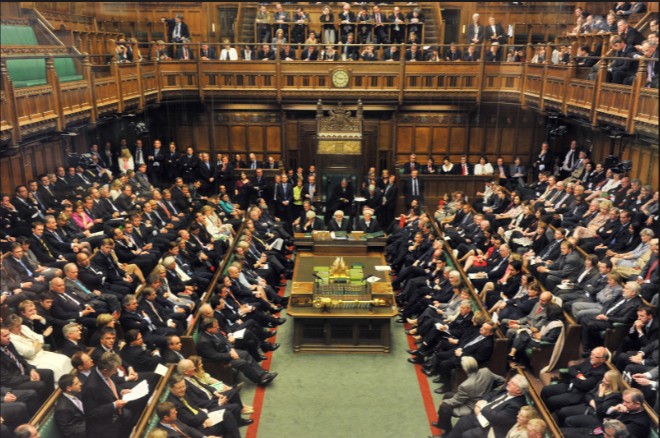In Nigerian official and media circles (not IGBERE TV) and even wider, the never-ending mass murder by Fulani herdsmen/militia has regularly been tagged “herdsmen and farmer clashes”.  In Nigerian official and media circles (not IGBERE TV) and even wider, the never-ending mass murder by Fulani herdsmen/militia has regularly been tagged “herdsmen and farmer clashes”.
In Nigerian official and media circles (not IGBERE TV) and even wider, the never-ending mass murder by Fulani herdsmen/militia has regularly been tagged “herdsmen and farmer clashes”.
Naijiant.com has long argued that this label muddies the waters and fails to show the clear divide between perpetrators and victims. This theme was taken up yesterday in the House of Lords during a debate tabled by Lord Alton in which he asked the British government “what assessment they have made of the continuing violence between communities and armed groups in Nigeria”.
Watch the debate here.
He noted that: “Between 1 January and 1 May this year, there were 60 such attacks. However, compared with the recent escalation in attacks by well-armed Fulani herders upon predominately Christian farming communities, the asymmetry is stark and must be acknowledged by the UK Government in their characterisation and narrative of this violence. Given the escalation, frequency, organisation and asymmetry of Fulani attacks, does the Minister believe that the references to ‘farmer-herder clashes’ still suffice? In the face of the reports of violence collected by impartial human rights groups, there is no place here for, as it were, moral equivalence; nor is it sufficient for the Government merely to urge all sides to seek dialogue and avoid violence”.
He stated earlier that “…the tragic topicality of today’s debate was underlined last weekend when more than 200 people were reported to have died in co-ordinated attacks on around 50 communities in Plateau state in Barkin Ladi. These attacks began on 22 June and lasted until 24 June. The majority of the victims were women and children. At one location, 120 were killed as they returned from the funeral of an elderly member of the Church of Christ in Nations. A dawn to dusk curfew was established and, as I heard first hand yesterday from the honourable Rimamnde Shawulu Kwewum, a member of the Nigerian Federal House of Representatives, the area remains tense. This most recent episode is shocking, but it is also the latest in an extended pattern of violence that has become all too common across Nigeria, particularly in the Middle Belt and increasingly in some of the more southern states”.
He added: “CSW [Christian Solidarity Worldwide] reports that in the first quarter of 2018, Fulani herder militia perpetrated at least 106 attacks in central Nigeria. The death toll in these four months, purely from herder militia violence, stands at 1,061. An additional 11 attacks recorded on communities in the south of the country claimed a further 21 lives. One spokesman said: ‘It is purely a religious jihad in disguise’”.
Continuing his opening statement, Lord Alton said: “Beyond intermittent verbal condemnations, I cannot see much practical action that has been taken to end the violence, which has emboldened perpetrators even further. Moreover, in the light of such an inadequate response thus far, communities will begin—and indeed already are beginning—to feel that they can no longer rely on government for protection or justice, and a few take matters into their own hands. In the words of an Anglican canon in the Middle Belt, ‘Why do so many security service personnel spend their time guarding our politicians, rather than protecting our people?’ I also put on record a recent statement to President Buhari issued by the Catholic Bishops’ Conference of Nigeria. Among other things the statement said:
‘Since the President who appointed the Heads of the nation’s Security Agencies has refused to call them to order, even in the face of the chaos and barbarity into which our country has been plunged, we are left with no choice but to conclude that they are acting on a script that he approves of. If the President cannot keep our country safe, then he automatically loses the trust of the citizens. He should no longer continue to preside over the killing fields and mass graveyard that our country has become.’
“That is a pretty awesome statement from a bishops’ conference.
“Concern about partiality was also raised on 24 March, by the highly respected former army chief of staff and Defence Minister, Lieutenant General Theophilus Y Danjuma, who stated that the armed forces were, ‘not neutral; they collude’ in the, ‘ethnic cleansing in … riverine states’, by Fulani militia. He insisted that villagers must defend themselves because, ‘depending on the armed forces’, will result in them dying, ‘one by one. The ethnic cleansing must stop … in all the states of Nigeria; otherwise Somalia will be a child’s play’.
Lord Chidgey agreed saying: “In Nigeria, attacks are now occurring with such frequency, organisation and asymmetry, …. references to “farmer-herder clashes” are wholly inadequate. Armed with relatively sophisticated weaponry, particularly AK47s, the Fulani herder militia is thought to have murdered more men, women and children, between 2015 and 2017, than Boko Haram.
“It has overrun and seized property and land, and displaced tens of thousands of people. In 2017, herder militia claimed 808 lives in 53 villages in southern Kaduna alone, burning down over 1,400 houses. …. during most of these well-planned attacks, herders’ cattle were nowhere in sight. Over 180,000 people in Benue state are currently living in IDP camps because the herder militia violence has displaced them. More than 500,000 displaced people are living in temporary accommodation, and over 80,000 school-age children are living in IDP camps with no access to education.
“Attacks continue unabated, with seemingly little government action. This has entrenched impunity. Apart from verbal condemnations, there has been no action to end the violence. No attacker has been brought to justice. With perpetrators emboldened, attacks by herder militia have now spread to southern Nigeria. No longer able to rely on the Government for protection or justice, communities are seeing a growth in vigilantism and retaliatory justice. The growth in murders of villagers and community leaders in Benue has also led to calls for President Buhari to consider his position, and for the reassessment of security arrangements as a matter of urgency”.
Baroness Cox added this on the theme of the labelling of the violence: “Related concerns expressed by local people include the interpretation of the situation as intercommunal attacks, with both sides being equally guilty. One resident said: ‘It is annoying when politicians say this is a clash between herdsmen and farmers. I ask, how does a woman farming in her own farm clash with Fulanis carrying AK-47s?’”. Cox also said: “I have visited many times and seen the tragedies of death and destruction in Bauchi, Kano and Plateau states. But more recently, as other noble Lords have described, there has been a very disturbing change in the behaviour of the Fulani herdsmen. Since time immemorial, they have driven their huge herds of cattle through other people’s lands, causing tensions and some violence, but traditionally, they have moved on. However, in the last two to three years they have adopted a new policy: attacking Christian villages, killing local people, destroying homes, driving villagers off their lands and settling in their place. Now there has been this recent escalation of attacks on Christian villages by the Fulani, with, …. over 200 civilians killed in Plateau state just last weekend. The Miyetti Allah Cattle Breeders Association of Nigeria has claimed responsibility for the attack”.
Another contributor to the debate, Lord Suri, suggested that the general description of the conflict was not helpful: “The human rights situation in Nigeria has deteriorated significantly in recent years, with a particular surge in attacks by non-state actors—notably armed Fulani herdsmen, also known as the Fulani militia: “Successive Governments have failed to respond effectively, and the violence perpetrated has increased exponentially. Although ongoing in central Nigeria since 2011, attacks spiralled following President Buhari’s inauguration in May 2015, with states experiencing intense violence in a cyclical manner. Such attacks by increasingly well-armed herdsmen on farming communities in the states of Adamawa, Benue, Kaduna, Nasarawa, Plateau and Taraba now occur with frequency, precision and asymmetric violence, rendering references to ‘farmer-herder clashes’ obsolete”.
He added: “The situation has been exacerbated by inadequate government action which has enabled attacks to continue unabated. Beyond intermittent words of condemnation, the Government have failed to formulate effective strategies to address this violence. This has entrenched impunity and emboldened perpetrators even further, leading to a growth in vigilantism and periodic retaliatory violence, as communities conclude they can no longer rely on government for protection or justice. However, this retaliatory violence is by no means symmetrical—the first quarter of the year saw 106 attacks by the herder militia in central Nigeria, while seven attacks within that timeframe on Fulani herders or communities claimed 61 lives.
“The number of attacks and casualties is staggering, and our Government must recognise the considerable escalation in the regularity, scale and intensity of the attacks by Fulani militia on these communities in central Nigeria. We must commit to doing more to encourage and support the federal and state governments to provide protection to those who live in constant threat of attack by a force that constitutes a major threat to national security. As a matter of urgency, we must encourage the formulation of a comprehensive and holistic security strategy that adequately resources the security forces to address this and other sources of violence. Can the Minister provide assurances of action? Will the UK Government do all they can to work with the Government of Nigeria, encouraging them to be more proactive in ending this appalling violence and to protect these vulnerable communities living in constant fear for their lives?”
The British government response was typically mealymouthed as the Nigerian government is an ally. It was given by Baroness Goldie. She said: “The description ‘farmer-herdsmen’ is broadly correct, but it does not fully represent the complexity of the situation. Violence has escalated over the past year—the reasons for this are many—but we are not aware of evidence to support the view that religion is driving this conflict”. On causes, she said they “relate to land, farming rights, grazing routes and access to water. The situation is not helped by a narrative which overplays the ethno-religious dimensions and oversimplifies a complex picture, conflating criminal violence, caused by cattle rustlers and bandits, for example, with community clashes”.
Baroness Goldie also seemed to confirm what Naijiant.com wrote in April that Prime Minister Theresa May didn’t raise Fulani herdsmen violence during her meeting with President Buhari: “The noble Lord, Lord Tunnicliffe, and the noble Baroness, Lady Cox, also asked whether this conflict and its impact were discussed when the Prime Minister met President Buhari in April. They discussed a number of issues, including security threats faced by the Nigerian people. The focus of these discussions was the conflict with Boko Haram and Islamic State West Africa in north-east Nigeria and the abduction of the Chibok and Dapchi girls”.
She ended by saying: “It is imperative that the Nigerian Government address the violence and instability in both the north-east and the Middle Belt areas of the country. They need urgently to put in place long-term solutions that lay the foundations for a sustainable and peaceful future for all communities. The United Kingdom will continue to provide support to the Government of Nigeria in their efforts to build that future. I thank noble Lords for ensuring that this deeply troubling situation remains the subject of continuing discussion”.
Most readers should be able to conclude from this that the British government are not in a hurry to help resolve the crisis. It is more likely that they are “colluding” with the Nigerian government like Danjuma said the military was doing with the mass murdering Fulani militia.








